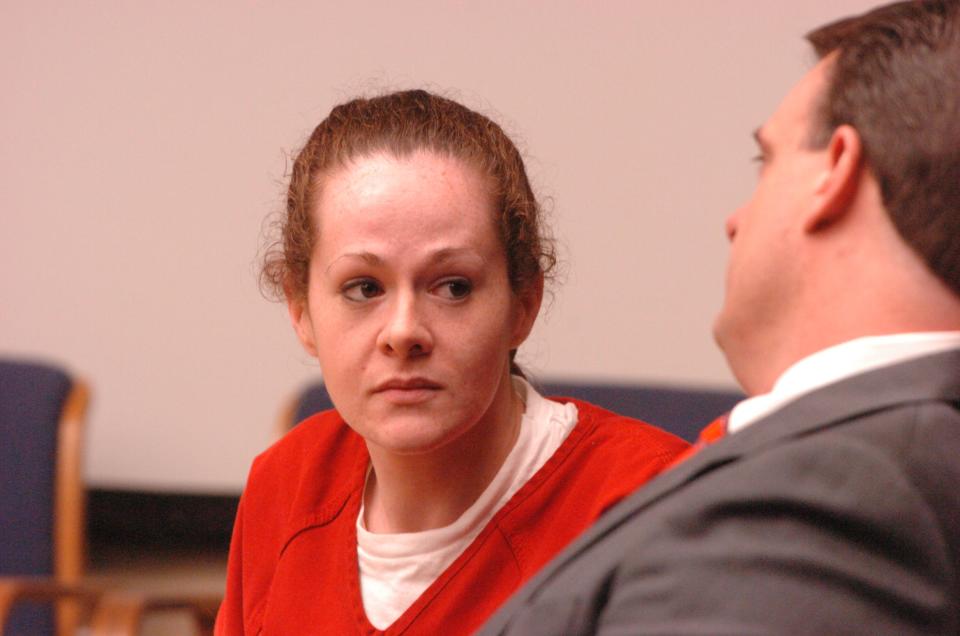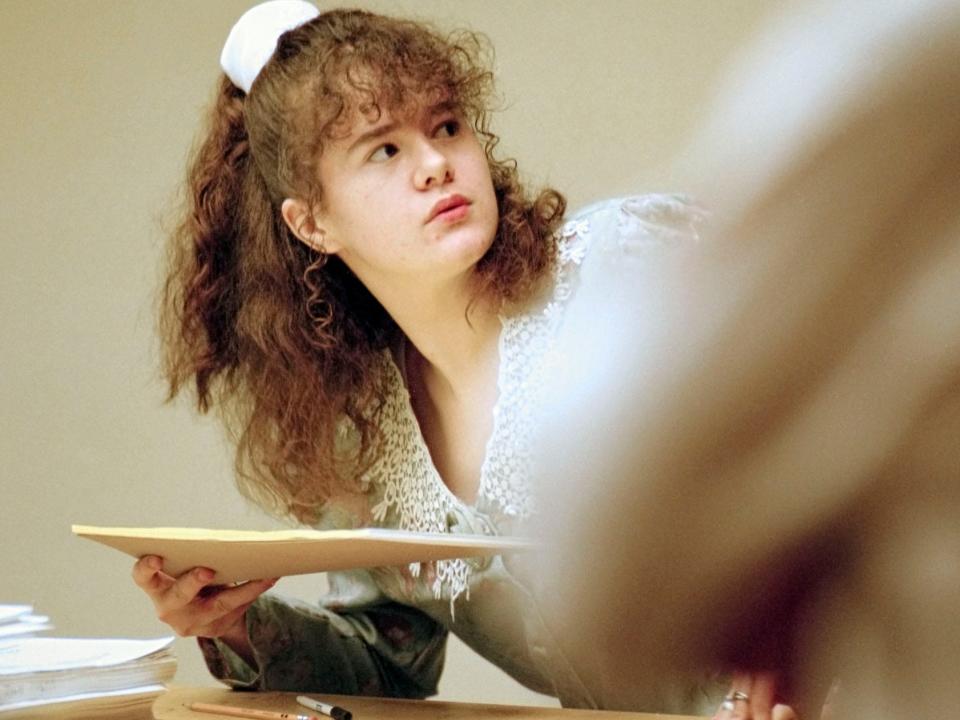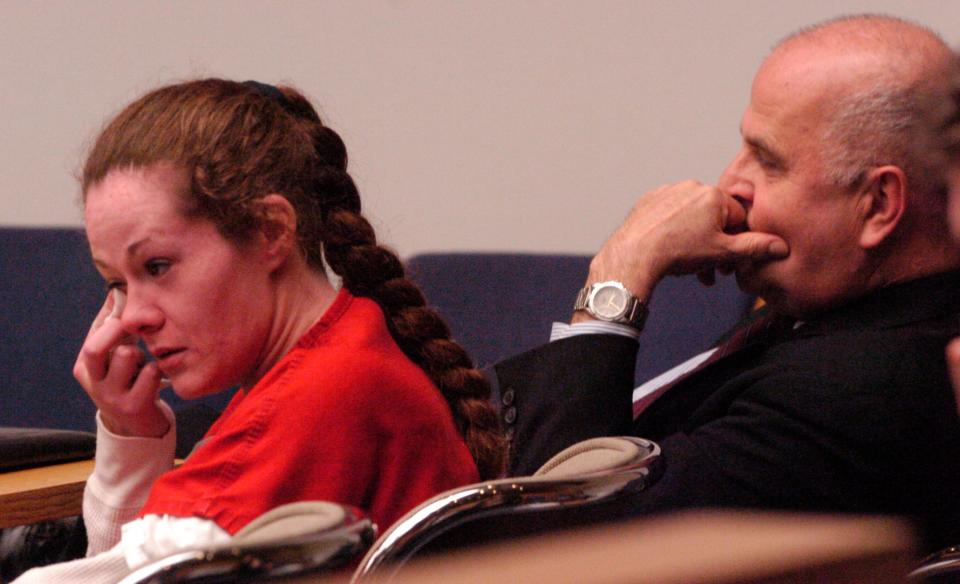Christa Pike, who would be first Tennessee woman executed in 200 years, moves to reopen appeal
Christa Pike's attorneys have tried at least three times in federal and state court to get her off death row.
That's not stopping them from trying again.
Pike's counsel filed a motion in Knox County Court on Wednesday to reopen her petition for post-conviction relief, arguing that a recent court opinion shows courts have recognized that youth serves as a factor in sentencing, a development the attorneys say aligns with decades of research into adolescent brain development.
They hope it will also allow them to bring before the original trial court years of evidence of Pike's then-untreated severe mental illness and extensive trauma, which trauma psychologist Dr. Bethany Brand called "one of the most tragic and profound chronic abuse histories I've heard of."
Pike, now 47, was 18 when she brutally tortured and killed fellow Knoxville Job Corps member Colleen Slemmer with two other young people, repeatedly beating and cutting Slemmer with a knife.
Pike was convicted and sentenced to death in 1996, making her the last person in Tennessee to receive a death sentence for a crime committed as an 18-year-old. She has been the only woman on Tennessee's death row since 2010, when then-Gov. Phil Bredesen commuted the death sentence of Gaile Owens, who died in 2010.
Two years ago, officials moved to set her execution date.
If her sentence stands, Pike will be the first woman executed in Tennessee in over 200 years. She would be the first person put to death in Tennessee for a crime committed at age 18 since the death penalty was reinstated nationwide in 1976.
"Since 1996 both Christa and our state have changed," said Pike's attorney Kelly Gleason of the Tennessee Office of the Post-Conviction Defender. "We know so much more about the adolescent brain, mental illness and trauma. If Christa were tried today, her youth, trauma and severe mental illness would be taken into account, and she would be sentenced to life imprisonment."

In a handwritten letter to The Tennessean, Pike says she takes responsibility for what she did. She also says she's "changed drastically since I was a teenager."
"Think back to the worst mistake you made as a reckless teenager. Well, mine happened to be huge, unforgettable and ruined countless lives," she wrote. "I was a mentally ill 18 yr. old kid. It took me numerous years to even realize the gravity of what I'd done. Even more to accept how many lives I effected. I took the life of someone's child, sister, friend. It sickens me now to think that someone as loving and compassionate as myself had the ability to commit such a crime."
Brand said Pike still struggles with mental health, "but she's become much, much more understanding of herself and people" over the years.
Pike is also represented by Randy Spivey of the Tennessee Office of the Post-Conviction Defender.
Slemmer's mother May Martinez said she wasn't surprised that Pike's attorneys were trying again to reduce her sentence.
"My daughter will never go to rest knowing all this is still happening," she said in a phone interview Wednesday. "I just turned 70. So I'm saying you know, I might not be alive when it happens."
Pike's history of abuse, neglect and mental illness
The 26-page petition states plainly what Pike's attorneys feel are the mitigating factors in her case: "In addition to her youth, Christa Pike was also severely mentally ill, and had a horrific childhood and adolescence."
Pike was born in Beckley, West Virginia, into a family with a "long history of interpersonal violence, substance abuse and child abuse," according to Brand's extensive psychological report on Pike, attached to the petition.
Pike was raped several times in her youth, as early as preschool by her grandmother's boyfriend, who threatened to kill her pets or hurt her family if she told anyone. Her home life was volatile, filthy and cruel, and the few family members she developed a relationship with did little to stop the abuse at the hands of other adults in her life.
The Tennessean does not typically name victims of sexual assault but opted to in this case because the extent and severity of Pike's trauma is central to her petition for post-conviction relief.
She began abusing marijuana at 9 years old and drinking alcohol at a very early age, remarking that she was outdrinking grown men by age 12.
Throughout her horrific childhood, Pike developed post traumatic stress disorder and already had signs of untreated bipolar disorder, Brand said. It's then that she also likely began to dissociate as a means to escape her life, Brand said.
All these factors combined with her brain development at 18, which in a more typical teenager would still be far from developed.
"So this means that Christa's brain at 18 years old was not only immature and underdeveloped, like any other 18-year-old, but also had damage in the same area that's responsible for good decision making," said Ali Winters, a social worker and clinician who has worked with Pike for years.
When she was in the midst of what she experienced as distress, her brain had already been trained to malfunction, based on what Brand told The Tennessean.
"I know she was part of creating a horrible situation. But her brain did what it had learned to do, and that was to dissociate so she wasn't fully in a normal way of thinking, a rational way of thinking and behaving," Brand said.
January 12, 1995

After she was sent to the Job Corps, a federal program to help low-income youth, in Knoxville, she developed a relationship with a boy in her class, Tadaryl Shipp. Pike became jealous of Slemmer, who she felt was flirting with Shipp.
On Jan. 12, 1995, she, Shipp and her friend Shadolla Peterson planned to lure Slemmer out by the University of Tennessee's campus. There, they carried out the torture and killing.
Pike broke part of Slemmer's skull and kept it. The day after the killing, Pike showed up at the scene of the crime, dancing and singing, a haunting fact that was repeated in media coverage.
Her actions were heinous. But Brand says based on her conversations with Pike that she was not in touch with reality at the time.
"It made it sound like she was jubilant. I think she was psychotic or very close to psychotic," Brand said.
Pike's attorneys note in the petition that while courts have since said that Shipp was equally responsible for the murder, his age prohibited him receiving a death sentence. He was 17 at the time of the crime and was sentenced to life in prison with the possibility of parole. Peterson received a six-year probationary sentence.
Early on in her sentence, Pike was convicted of the first-degree attempted murder of fellow incarcerated woman Patricia Jones. Her attorneys say that she was still unmedicated for her mental illnesses at that time.
In the years since the murder, Slemmer's mother, Martinez, has repeatedly called for Pike's execution.
"Honestly, my heart breaks every single day because I keep reliving it and reliving it," Martinez told WBIR in 2021. "They both get fame from it. And I just want Christa down so I can end it."
Pike said she's apologized to Slemmer's mother face-to-face, "but I'm not sure it was accepted."
"I wish I could say or do something that would ease her pain but I know that's impossible," she wrote in the letter to The Tennessean.
But Martinez said Pike never tried to apologize to her during trial and hasn't reached out after being convicted.
Martinez said she can't find peace until Pike is executed because until then, part of her daughter’s skull will remain in state custody.
"I can't find peace, knowing that still part of your daughter is in the state," Martinez said.
'There is no hard line of maturity'
Pike's attorneys see the Tennessee Supreme Court's November 2022 decision in State of Tennessee v. Tyshon Booker as opening the door for her appeal.
The court ruled in Booker that Tennessee's mandatory life sentence for homicide convictions is unconstitutionally cruel when applied to minor offenders because "juveniles are constitutionally different than adults for sentencing purposes; juveniles have lesser culpability and greater amenability to rehabilitation."
Pike's attorneys argue that the principles underpinning that decision should apply also to those who are still in adolescence but not legally juveniles.
"If the courts agree that a 17-year-old is not eligible for mandatory life in prison due to well-established adolescent brain science, we should not death-sentence an 18-year-old. There is no hard line of maturity or difference between the brain development of a 17-year-old and 18-year- old," Gleason said.
Gleason said she expects the court will hear from the state before ruling on the motion to reopen Pike's petition for post-conviction relief.
Solitary confinement
Pike is involved in a distinct lawsuit against state corrections officials, arguing that departmental rules have kept her in de facto solitary confinement for more than 25 years.
She says that for the greater part of her incarceration, she has had "no social engagement with other incarcerated individuals or prison staff, no educational or religious programming, and nearly no physical contact with another human being."
Pike's mental and physical health have deteriorated as a result of her confinement, the effect of which has been exacerbated by her pre-existing psychiatric conditions, the lawsuit states.

The lawsuit states a Tennessee Department of Correction (TDOC) policy requiring that those sentenced to death be housed in areas segregated from the prison's general population has resulted in her prolonged solitary confinement.
The 46 men on Tennessee's death row "have freedom of movement, can socialize with each other, hold jobs, and attend educational and religious programming together" with the other men sentenced to death, but Pike, as the sole woman on death row, is confined alone, the lawsuit states.
“TDOC’s policy of segregating death row inmates from other inmates may make sense for men but has resulted in years of prolonged isolation for Ms. Pike as the only woman on death row. She filed this lawsuit to be able to share a meal, participate in group therapy, work at a job, or have some minimal interaction with others," said attorneys Brian Roark and Angie Bergman, who are representing her in that case.
State attorneys say her treatment falls "far shy" of cruel and unusual punishment as she has food, shelter, clothing and two hours of recreation per day, as well as access to a television, radio and a few other items.
Michele Deitch, director of the Prison and Jail Innovation Lab at the University of Texas' Lyndon B. Johnson School of Public Affairs, said more experts are recognizing research showing the harms of prolonged solitary confinement.

Prolonged solitary confinement has been recognized as torture by several international organizations, including the United Nations.
"These people (on death row) were sentenced to be executed; they weren't sentenced to be tortured," Deitch said. "And there's a belief that what people experience in solitary confinement is tantamount to torture."
Pike, 47, is housed at the Debra K. Johnson Rehabilitation Center (DJRC) in Nashville. Last August, she filed her lawsuit in the U.S. District Court for the Middle District of Tennessee against former TDOC Commissioner Lisa Helton, DJRC Warden Gloria Fisher and other TDOC and DJRC leadership.
Pike claims that her treatment violates the Eighth Amendment's protection against cruel and unusual punishment; the Fourteenth Amendment's equal protection clause because she is being treated differently than men on death row; due process protections because her prolonged isolation is without "legitimate penological interest"; the Americans with Disabilities Act due to her mental illness; and her rights to have contact with her attorney and spiritual adviser.
TDOC officials have made exceptions to the mandatory segregation rule for death row prisoners before. Owens, the other woman previously on death row, was allowed to live in the prison's general population.
Evan Mealins is the justice reporter for The Tennessean. Contact him at emealins@gannett.com or follow him on Twitter @EvanMealins.
This article originally appeared on Nashville Tennessean: Christa Pike, only woman on Tennessee death row, asks to reopen appeal

